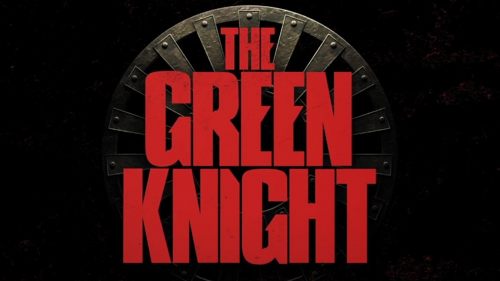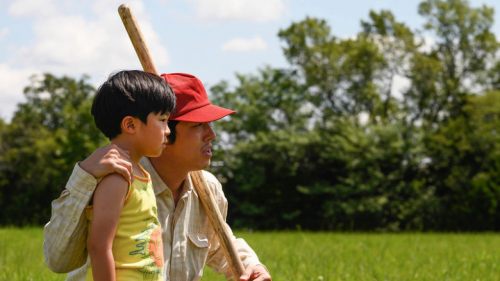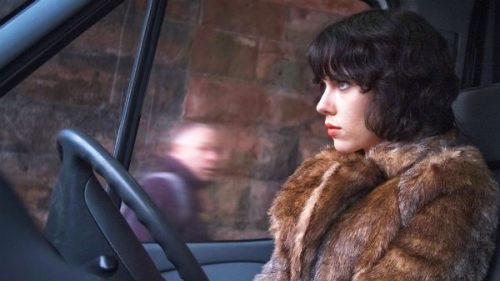The Badass Interview: Harmony Korine On SPRING BREAKERS
Harmony Korine is a serious filmmaker, not that he'd admit it. Raised by a documentary filmmaker who dragged him along with a traveling circus, and resettled the family in a commune, and weaned him on Werner Herzog and Jean-Luc Godard, Korine famously got his start when he met Larry Clark at a skatepark in New York City and asked if he could show him his 35-page script. That sounds like dumb luck, but consider this: how many other 19-year-old skaters would recognize Larry Clark?
After he wrote Kids and directed Gummo, Korine tried to grow up. Mister Lonely sagged with the soft desperation of aging impersonators who know they can't play boy king Michael Jackson forever, and Trash Humpers—his weirdest, wildest, and my personal favorite of his films—unleashed sex-mad senior citizens on the streets of Nashville. But he's happily regressed for Spring Breakers, a giddy, hazy lucid dream of bikinis and destruction. What is Korine, the former enfant terrible of the art house, saying when he straps Disney princess Vanessa Hudgens with a loaded gat? Korine wants his work to do the talking—but I still try to get him to give us a straight answer.
After he read the script for Spring Breakers, the mayor of St. Petersburg refused to give you any support. How did that affect the shoot?
It probably just helped me. It rearranged the way I thought about things. If someone doesn't help you, you still have to get what you need to get, so you have to shift the way you go about getting it. I never expected help, anyway—I don't expect help from any mayor. When was the last time a mayor actually helped somebody? No mayor has ever helped me before in my life.
Maybe a mayor will read this and decide to do something nice for you.
They should give me a key to the city.
Do you feel that Florida is the epicenter of all weirdness in America?
It really is. It really is something special when it comes to weirdness. It's almost like its own universe— it works on its own logic. It's incredible that place, how strange it is.
I was a nerd in college. Those opening shots of girls going wild on Spring Break—is that really how it is?
Yeah, except for that it's probably not slow motion.
Were they extras or real people?
We hired them all. They were Spring Breakers that we put together. Others were just, like, Hooters waitresses and surfers.
How did you explain to them the film you were making?
I didn't really explain the whole film to them. I just explained the scene: “Jump up and down and shake your boobs.”
And drink beer and party. Best gig ever.
Yeah—it's America.
There's been some moralizing about the girls in the film. Would reactions be different if you had cast four boys instead of four girls?
Of course—are you kidding? Absolutely. It'd be a whole different movie. It would also shift the whole meaning in another way that probably would open some other type of floodgates, as far as that goes. You know what I mean? You can never make everyone happy. All that discourse is good.
True. The conversations about the Steubenville rape trial remind me of the hardest scene in your movie: when Rachel [Korine, his wife] is drunk and alone with a group of strange guys. To me, it's worse than the violence. It almost feels like you're asking if women can be complicit in their own victimization.
I don't know? I'd rather you say it than I say it. I make movies because I hope that you notice things like that.
So you're setting up questions for other people to answer?
It's not even that. It's like, I try to make movies that aren't just one way. Movies that are more like an emotion, like a feeling, something that washes through you in a way. Certain things are difficult to articulate. It's like life—it's everything and nothing, and sometimes both simultaneously.
Which is kind of how you portray violence in the movie. You show two things at once: how for the girls, it's glamorous. But only the audience sees the terror of their victims.
I don't really think in terms of balance. It's more intuitive. I try to go for things that make me feel emotionally confused, or emotionally more ambiguous. Things that are working in several ways simultaneous. For instance, that robbery montage with the Britney Spears is, like, equal parts horrific and beautiful, right? It's horror and it's comedy and ethereal and hyper-poetic, and it all kind of coalesces in this strange, organic way. That's what I'm trying to get at: things that aren't easy. That aren't just, “This is a bad guy, this is what a bad guy does. This is a good guy, this is what a good guy does.” You want to go for things that have more range and transcendence.
For a lot of Selena Gomez and Vanessa Hudgens fans, this is the first Harmony Korine film they'll have ever seen. Which one would you recommend they watch second?
They should just start at the beginning and work their way up. So they should start at Gummo.
If a 19-year-old today wrote Kids for his generation, what would be different?
The truth is: as far as impulses, behavior, it's probably the same thing. People are people, whether they're born this decade or two decades ago. But the big difference, obviously, is the way that people communicate. The way that social media has affected communication and human interaction. In Kids, there were no cellphones, there was no internet. Philosophically, it was more based in the idea of getting lost, being lost, running away in the shadows. Having as little contact with a corporate entity or parental structure as humanly possible. Whereas now, it's a display culture—more of a performative culture. It's more about being found. Now everyone wants you to know what they're doing all the time. Which is still interesting, it's just interesting in the opposite way.
What's also interesting is that in Kids, the stakes are literally life and death because they're afraid of AIDS. In Spring Breakers, they're most afraid of boredom.
Exactly.
What movie best describes your own life?
Brewster McCloud.
Really? Why is that?
Well, you don't want to explain it too much...
One of my friends is worried that James Franco's “Look at my shit” riff is so quotable that it's going to become the next pop culture cliché like Borat's “Very nice.” How would you feel if that happened?
Are you kidding? I think it would be amazing. That scene with his character is so insanely wild, charismatic, that it's hard not to quote a lot of it. It kind of burns off the screen. That's cool—I would love it. You want people to feel close to your movie, to be connected.
A transcript just went up online and I realized I'd totally overlooked his joke about gold bullets and vampires. Was that scene improvised?
It was done in rehearsals. I read all the time people with this ideal of improvising. I don't do a lot of improvising, really. I guess people consider it improvising if it's not written. That sequence wasn't written. But it was like—how do I describe it?—like doing a freestyle rap. But they've still thought of certain rhyme patterns, you know what I mean? They go in with certain things and then riff about it on the day. Or it's like making a painting. You have a specific idea, but it starts off abstract and then becomes more figurative as you go.
This is silly, but did the girls pick their own bikinis?
I think what it was is we had a lot of bikini choices that were about our colors and stuff. They had choices within certain confines, options of shape. But it was all pretty designed.
When you're working with girls like Vanessa and Selena and there are, say, concerns about image, who's harder to deal with on set: moms or managers?
I don't deal with any of that stuff. I'm a director. I design my life in a way that I just don't have to deal with that, so if it happens, it doesn't happen through me. It happens through producers and stuff like that. Everyone knows I don't deal with it.
That must be nice.
[Laughs]
Last question: what do Selena Gomez and Gucci Mane have in common?
Swagger.



